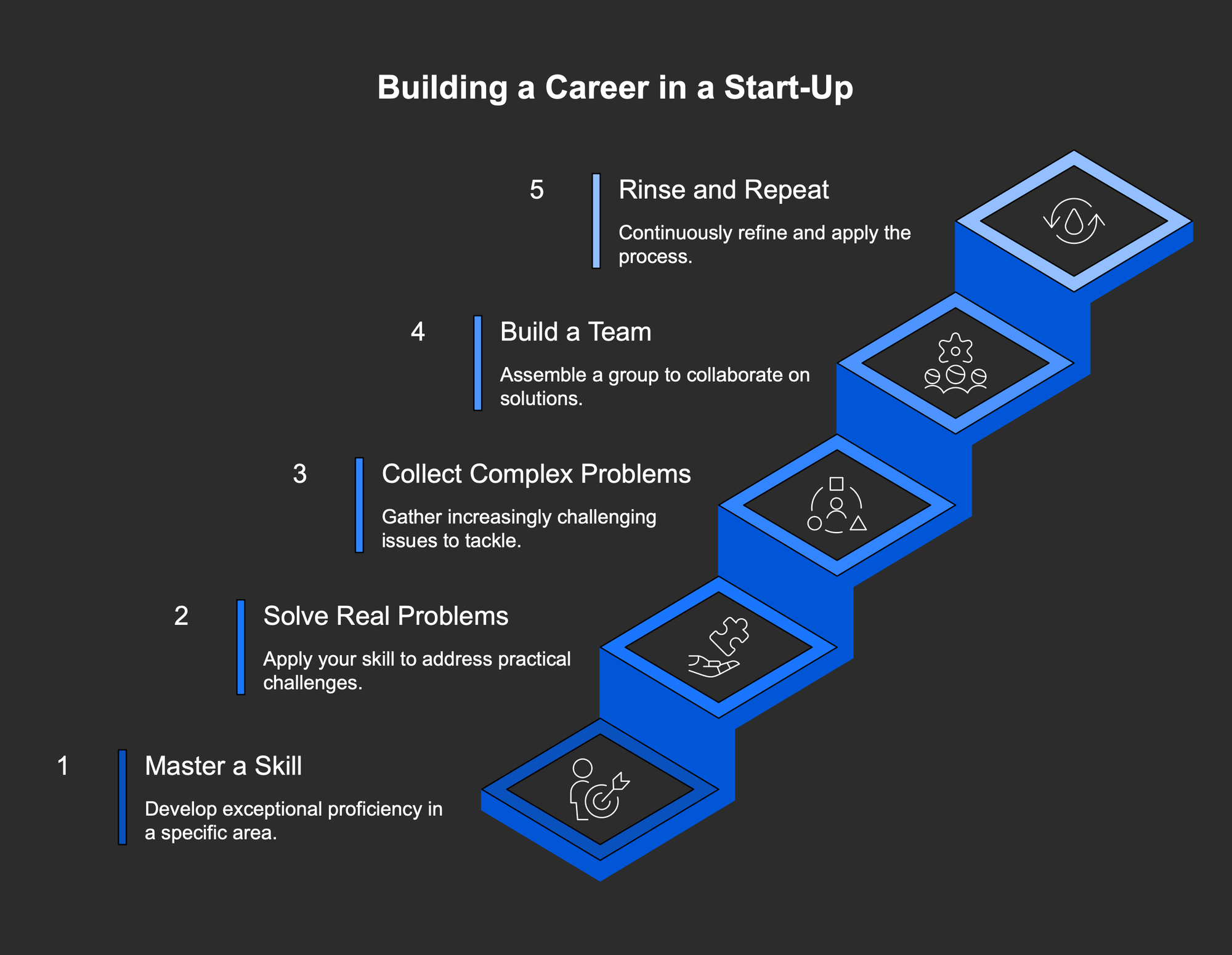Startup Career Reality Check: Where Potential Meets the Hustle
Forget traditional career ladders. In the startup world, your path to success isn't discovered—it's created through solving increasingly complex problems. Learn how real potential gets recognized, developed, and leveraged in high-growth environments where traditional rules don't apply.

Let's be honest about "career paths" in startups. There isn't some neat little corporate ladder with predictable rungs waiting for you. That's the whole point.
If you wanted a clearly defined career trajectory with quarterly performance reviews and a pension plan, you'd be working at IBM in 1985, not a startup in 2025.
But here's the truth that no one's telling you: this ambiguity is where all the magic happens.
Your Potential Is Like Schrödinger's Cat
In a corporate world, "high potential" means you've been officially blessed by HR and put on some secret list. In startups, potential is that weird quantum state where you're simultaneously crushing it and completely failing until someone observes you doing something remarkable.
I've seen it a thousand times. The junior dev who randomly steps up during a crisis and suddenly everyone's like, "When did she become a leader?" The sales guy who pivots to product because he built something customers wanted over the weekend.
Your potential isn't discovered in startups – it's created through doing things no one asked you to do.
The Only Career Path That Matters
Here's your actual career path in startups:
- Solve problems
- Solve bigger problems
- Teach others to solve problems
- Decide which problems are worth solving
- Fund the solving of problems
Notice I didn't mention titles, departments, or reporting structures. That's because they change every six months in a startup anyway.
Personal vs. Professional Aspirations (A False Dichotomy)
Let me blow your mind: In startup land, personal and professional aspirations aren't separate tracks.
Want work-life balance? Cool. Build systems that don't require your 24/7 attention.
Want to travel? Great. Figure out how to deliver remotely while adding more value than the in-office folks.
Want to learn new skills? Awesome. Create a project that requires those skills.
The startup that's worth your time will see these as features, not bugs. If they don't, 10,000 other startups will.
How Real Coaching Works in Startups
Forget formal mentorship programs. The best coaching in startups happens in three ways:
- Crisis coaching: "We're about to miss a deadline/lose a customer/run out of money. What do we do?" These moments teach you more in 48 hours than a year of MBA classes.
- Proximity coaching: Sitting next to someone better than you at something. Not asking them to "mentor" you – just absorbing how they think through problems.
- Consequence coaching: Making mistakes and dealing with the fallout. There's no better teacher than your spectacular failures in a high-stakes environment.
The Unspoken Truth About "Potential"
I've hired dozens of people, and here's my secret: I don't care about your "potential." I care about your output paired with attitude.
I hire for attitude and train for skills. In the startup world, your mindset and adaptability will take you further than any credential or technical skill you walk in with. The right attitude creates an infinite ceiling for growth—everything else can be taught.
Potential is just vapor until you convert it into tangible results. The best founders and leaders I know don't sit around spotting "high-potential individuals" – they create environments where people can demonstrate their capabilities through action.
Your Real Career Path
Want the actual blueprint? Here it is:
- Become irrationally good at something specific
- Make that skill visible by solving real problems
- Collect increasingly complex problems to solve
- Build a team to solve those problems
- Rinse and repeat
Everything else is just fancy window dressing.

The Startup Mindset: Beyond Traditional Career Planning
The beauty of startup environments is that they reward initiative over credentials. While traditional career paths might require specific degrees or certifications, startups care more about what you can build, fix, or improve.
This means your career development becomes less about checking boxes and more about expanding your impact radius. Each project, crisis, or innovation becomes a building block in your professional story.
Finding Your North Star
The most successful startup professionals I've mentored all share one thing: they have a personal North Star guiding their decisions. This isn't just about "following your passion" (please spare me that tired advice). It's about understanding what problems energize rather than drain you.
Are you obsessed with user experience? Customer acquisition? Technical architecture? Financial modeling? Find your sweet spot where curiosity meets competence, then become the go-to person for that domain.
Don't chase titles. Chase problems worth solving. The titles will follow – or become completely irrelevant, as you build something that makes traditional career paths look like ancient history.
Now go build something that matters. Your potential is waiting to be converted into impact, and no one's going to do that work for you.
Want to know more about the development plan? Check out my Intensity-Method Series.
Want to dive deeper into startup career development? Have questions about finding your path in high-growth environments? DM me or drop a comment below. I'm constantly collecting stories and strategies from the frontlines of startup culture, and I'd love to hear about your specific challenges. The conversation continues—let's make it a good one.
Stay Raw | Stay Real | Stay Intense.
